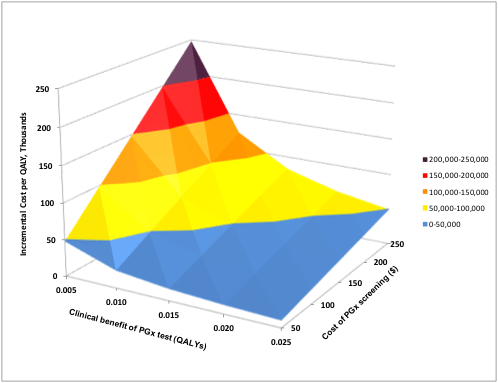 The Personalized Medicine Economics Research program is focused on three key policy questions that arise with personalized or precision medicine (PM):
The Personalized Medicine Economics Research program is focused on three key policy questions that arise with personalized or precision medicine (PM):
- What is the clinical and economic value of various PM applications?
- What will be the uptake of PM by providers, patients, and payers?
- Where are the best opportunities for investment in PM research?
The PriMER program was founded by a 5-year NIH grant on the economics of PM and now includes research activities across multiple projects, as described below. An interactive version of the PriMER Precision Medicine diffusion model is available here: https://uwchoice.shinyapps.io/primer/
PriMER is headed by David Veenstra, PharmD, PhD, of the UW CHOICE Institute, and includes the following faculty, graduate students, staff, and post-docs:
Faculty
David Veenstra, PharmD, PhD
Anirban Basu, PhD
Josh Carlson, MPH, PhD
Lou Garrison, PhD
Beth Devine, PharmD, PhD
Graduate students
Devender Dhanda, MS – CHOICE
Scott Spencer, MPH – Public Health Genetics
Shallak Gunjal, PharmD – CHOICE
Scientific Staff
Greg Guzauskas, MPH, PhD – CHOICE
Projects
R01 HG009694 01 Multi-PI (Peterson, Veenstra, Snyder) 9/1/17 – 8/31/21
NHGRI
Rational Integration of Sequencing (RISE)
Our goal for the project is to develop a simulation model to estimate the clinical efficacy and cost-effectiveness of primary genomic screening across a diverse patient population. We will develop a conceptual framework and computational infrastructure, and then populate the model using real-world data from Geisinger Health System. We will use the model to assess the cost effectiveness of genomic screening scenarios, identify key drivers of value, and inform research priorities in genomic screening
1 U01 AG047109-02 Veenstra (PI) 9/30/2013-6/30/2018
NIA
Personalized Medicine Economics Research (PriMER)
Our proposed research is relevant to public health because it will provide a foundation for assessing the value of genomic-based individualized care and identifying optimal opportunities for future research. In this way, genomic applications that provide the greatest benefit to patients will be identified and utilized, and genomics research that provides the greatest return on investment to patients and our healthcare system will be pursued.
1U01HG008657 Jarvik (PI) 8/1/15-7/31/19
Group Health Research Institute
Genomic Discovery and Implementation Across a Healthcare Delivery System: (eMERGE3)
The specific aims of our proposal are designed to advance the integration of genomic data into clinical practice, including facilitating family communication, evaluating patient perspectives and economic outcomes, defining the pathogenicity and penetrance of variants, identifying novel genetic associations, expanding electronic medical record (EMR) phenotypes, and broadening the impact of eMERGE through collaborations
Publications (selected)
- Bennette CS, Gallego CG, Burke W, Jarvik GP, Veenstra DL. The cost-effectiveness of returning incidental findings from next-generation genomic sequencing. Genetics in Medicine, 2015 Jul;17(7):587-95. Epub 2014 Nov 13. PMID: 25394171.
- Gallego CJ, Bennette CS, Heagerty P, Comstock B, Horike-Pyne M, Hisama F, Amendola LM, Bennett RL, Dorschner MO, Tarczy-Hornoch P, Grady WM, Fullerton SM, Trinidad SB, Regier DA, Nickerson DA, Burke W, Patrick DL, Jarvik GP, Veenstra DL. Comparative effectiveness of next generation genomic sequencing for disease diagnosis: Design of a randomized controlled trial in patients with colorectal cancer/polyposis syndromes. Contemp Clin Trials. 2014 Jul 3;39(1):1-8. PMID: 24997220
- Gallego CJ, Shirts BH, Bennette CS, Guzauskas G, Amendola LM, Horike-Pyne M, Hisama FM, Pritchard CC, Grady WM, Burke W, Jarvik GP, Veenstra DL. Next-Generation Sequencing Panels for the Diagnosis of Colorectal Cancer and Polyposis Syndromes: A Cost-Effectiveness Analysis. J Clin Oncol. 2015 Jun 20;33(18):2084-91. Epub 2015 May 4. PMID: 25940718
- Basu A, Carlson JJ, Veenstra DL. A Framework for Prioritizing Research Investments in Precision Medicine. Med Decis Making. 2015 Oct 26. PMID: 26502985.
- Feero WG, Wicklund C, Veenstra DL. The economics of genomic medicine: insights from the IOM Roundtable on Translating Genomic-Based Research for Health. JAMA. 2013 Mar 27;309(12):1235-6. PMID: 23532238.
- Bennette CS, Trinidad SB, Patrick D, Amendola L, Burke W, Hisama FM, Jarvik GP, Regier DA, Veenstra DL. Return of incidental findings in genomic medicine: Measuring what patients value. Development of an Instrument to Measure PReferences for Information from Next-generation Testing (IMPRINT). Genet Med. 2013 Nov;15(11):873-81. PMID: 23722871.
- Wong WB, Ramsey SD, Barlow WE, Garrison LP Jr, Veenstra DL. The value of comparative effectiveness research: projected return on investment of the RxPONDER trial (SWOG S1007). Contemp Clin Trials. 2012 Nov;33(6):1117-23. Epub 2012 Aug 18. PMID: 22981891.
- Thariani R, Henry NL, Ramsey SD, Blough DK, Barlow B, Gralow JR, Veenstra DL. Is a comparative clinical trial for breast cancer tumor markers to monitor disease recurrence warranted? A value of information analysis. J Comp Eff Res. 2013 May;2(3):325-34. PMID: 24236631.
- Carlson JJ, Thariani R, Roth J, Gralow J, Henry NL, Esmail L, Deverka P, Ramsey SD, Baker L, Veenstra DL. Value of Information Analysis within a Stakeholder-Driven Research Prioritization Process in a US Setting: An Application in Cancer Genomics. Medical Dec Making, 2013, May;33(4):463-71. PMID: 23635833.